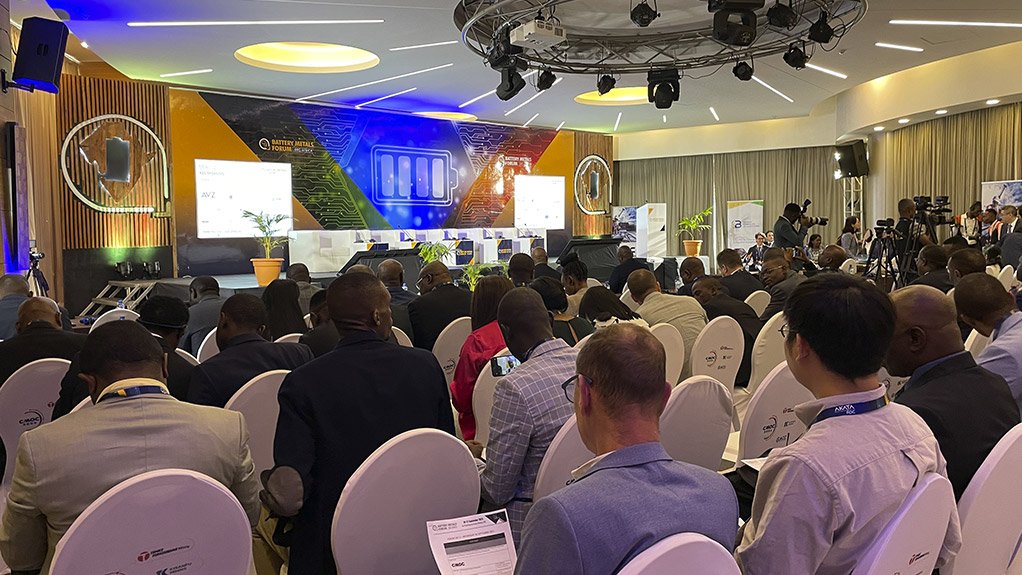
+27 11 441 1111
SRK House, 265 Oxford Road, Illovo, 2196, South Africa

DRC envisions a future with battery metals
As global exploration intensifies the drive for resources to service the energy transition, the first DRC-Africa Battery Metals Forum was held in Kinshasa to consider how to leverage the emerging opportunities.
Dominique Sambwa, chairman of SRK Consulting Congo, was present at the event with SRK colleagues from the Lubumbashi office as well as from SRK’s South Africa and China practices. Sambwa highlighted that a key focus of the forum was on the downstream beneficiation potential for the region, which DRC and Zambia hope to exploit through a Special Economic Zone (SEZ). DRC and Zambia produce over 70% of the world’s cobalt and 10% of global copper. According to the United Nations’ Economic Commission for Africa, the two countries are in a unique position to move from exporters of raw materials to becoming manufacturers of battery precursors – the material at the final step before becoming a cathode.
Collaboration
“It is encouraging to see the collaboration of governments at this level,” said Sambwa. “There is much interest in the outcome of the prefeasibility study which is underway to consider battery manufacturing in a SEZ shared by DRC and Zambia.”
He said there was little doubt that the presence of mineral resources like copper, cobalt, lithium and nickel made the region a focus of attention for the energy transition. However, the forum highlighted that there was still a great deal to be done in preparing the way for the necessary mining and industrial investment.
“The SEZ could provide the necessary impetus to put certain conditions in place so that key investors could be attracted to initiate the process towards battery manufacturing,” he said.
Resources identified
According to Lindsay Shand, associate partner and principal environmental geologist at SRK Consulting, a number of resource areas for lithium have been identified, with large mining organisations already involved at different stages of the permitting and mining process.
“The resource potential and mining aspects are fairly well known, and there are certainly opportunities to pursue,” said Shand. “Delegates at the forum raised the need for the DRC government to improve services and amend tax laws to encourage mining and associated industries. Delegates and presenters at the forum motivated for the government to make access to industry easier, and to provide greater incentive for investment in the DRC.”
Pengfei Xiao, managing director of SRK China, explained that SRK was already assisting clients with managing their exploration standards in relatively new mining areas like Manono, and was also guiding them on environmental, social and governance (ESG) aspects. The forum had reiterated the importance of international standards to ensure that benefits of mining can flow through to local communities.
Green value chain
She said mining company representatives at the forum also considered the green value chain, highlighting the need to re-establish hydroelectric power generation units to allow for the use of green energy in the mining process.
“Presenters representing mining houses commented on the need to support the agricultural sector to grow more food for increased numbers of staff in mines and associated industries,” she said. “There was also a focus on how the DRC could develop skills to support mineral processing and battery manufacturing – and the need to improve revenue generation through secondary and tertiary manufacturing activities.”
Sending signals
Xiao said the forum sent a strong signal from the DRC government that the country wanted to build in-country capability for battery manufacture. The event was a useful opportunity for stakeholders to highlight what needed to be done to make this possible.
“Among the main areas discussed was energy generation, infrastructure improvements and new policies and laws,” said Xiao. “It was an important beginning to what will be a long process, but the delegates were able to start discussing the main concepts.”
He noted that the mining and industrial developments envisaged during these discussions would all need to be planned and implemented in alignment with international standards – in a range of fields from mineral exploration, water management and ESG considerations. The SRK Congo office is already working closely with SRK South Africa and SRK China to share capacity and collaborate on DRC projects. Sambwa concurred that ESG would be a central aspect of the future developments.
Effective governance
“Governance really matters,” he said. “SRK is making our expertise available, to work closely wherever possible with governments and other players in paving the way for effective and transparent governance.”
With the battery metals space being, by its nature, oriented towards green energy and electric vehicles, Shand noted that it made sense for DRC and the region to work towards renewable sources of power, as part of ensuring that mining operations could operate with lower carbon emissions.
“The ESG aspects of battery metals mining and battery manufacturing therefore should be emphasised in policy and practice by stakeholders,” she said.
Hydro-power
Sambwa noted that the DRC has an installed capacity of more than 2 500 MW of hydro-electric power and in 2020 has produced more than 12 300 GWh, but with about 15% of electrification rate the country remained short of an equivalent amount despite an estimated potential capacity to produce 100 000 MW on the Congo River.
“Government is encouraging mining companies to help establish hydro-power sources,” he said. “However, while there are some areas where small hydro schemes from 50-100 MW could be feasible, these are often inaccessible or too far from the national grid.”
Need for strategy and sustainability
Andrew van Zyl, managing director of SRK South Africa, noted how the discussions were aligned with conferences and fora around the world. Globally, companies and other stakeholders are discussing how to mine materials that facilitate an energy transition and a move to sustainability while becoming more sustainable themselves.
SRK has been involved in facilitating discussions on what responsible sourcing means to different stakeholders in different regions. We are increasingly helping clients integrate their various strategic imperatives, including responsible sourcing, supply chain development and auditing, localisation, water stewardship, decarbonisation and continuing their focus on health, safety and human rights prerogatives.
Progress is being made on these complex, interrelated activities and this will benefit local communities. Mining companies for example promise to be a catalyst for development of renewable energy supply chains in new areas that are power hungry and also to facilitate development of infrastructure and agriculture to support these new operations. Importantly, mining companies are improving their ability to identify, quantify and mitigate the externalities associated with new operations.




